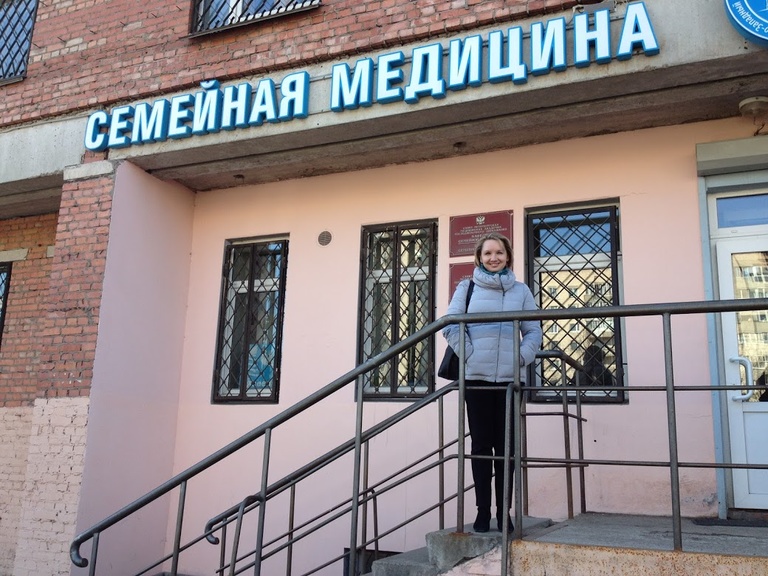
For more than twenty years the Department of Family Medicine at the University of Iowa has had an active collaboration with the Department of Family Medicine at the Medical Academy of Post-Graduate Studies (MAPO), now the Northwestern State Medical University (NWSMU) in St. Petersburg, Russia. During that time there have been family medicine faculty and resident physician exchanges, international medical conferences, and joint clinical research. The initial funding for this collaboration was made possible by a 1995-97 United States Agency on International Development (USAID) grant which helped establish the “Family Physician Development and Exchange Program." This is our story.
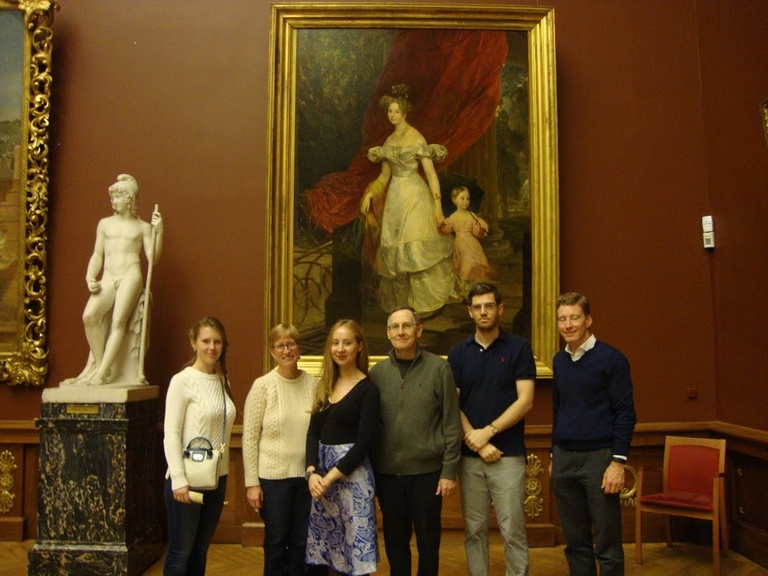
Delegation in 2016 from our department standing in front of a portrait of the patron of MAPO hanging in the Russian Museum - Professors Lynch, Jogerst, Wilbur are second fourth and sixth from left
In 1988 MAPO started a training program for family physicians. By 1992 family medicine was recognized as an official specialty by the Russian government and in March of 1994 St. Petersburg’s city board acknowledged the family doctor as the key element in reforming the primary healthcare system. The political environment was favorable for the promotion of the family medicine specialty coming at the same time as the breakup of the former Soviet states. USAID was looking to support collaborations to help the newly independent states into the market economy, so combining a training program to teach principles and practices of family medicine that included a substantial business component seemed a good fit for the USAID grant program. Initial contacts were made between Mike McNulty working out of the UI provost’s office and Vladimir Pletinsky who coordinated these activities for MAPO. The first visit to St. Petersburg was made in 1994 by Mike McNulty, Elizabeth Swanson, associate vice president for health sciences and Gerald Jogerst, interim head of the Department of Family Medicine, in order to formulate the grant proposal for USAID funding.
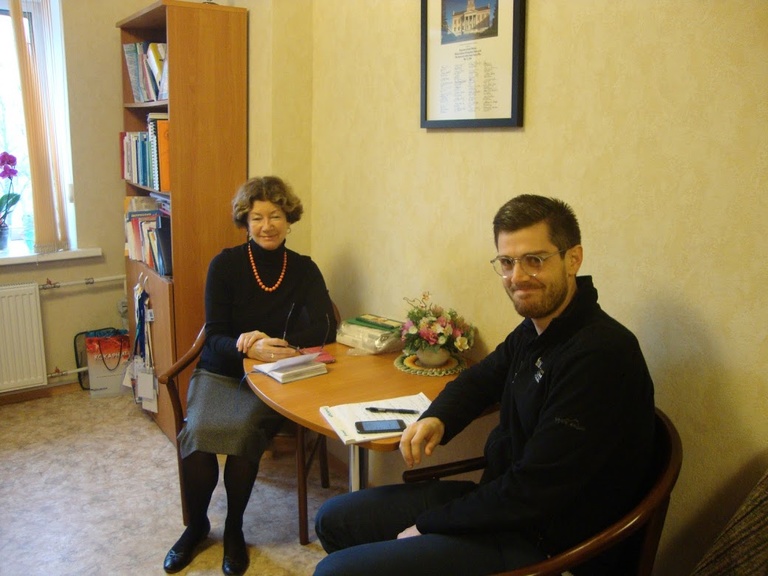
Professor Olga Kuznetsova, head of the Family Medicine Department at NWSMU, discussing a research project with Dr. James Jackson, resident in the UI Department of Family Medicine
A “train the trainer” program was assembled to teach five Russian physicians in our department who would return to Russia to teach family medicine in the department of family medicine at MAPO in a newly constructed and supplied family medicine clinic in St. Petersburg. The curriculum included a large business component on the management and finances of a medical clinic practice organized by Jude West, professor in the College of Business. This proposal was accepted by USAID and funded for one million dollars between 1995 and 1997.
Once funding was received, the next tasks were to identify physician candidates for the training program and to locate a suitable site for the model family practice office that would be used as the primary training location in St. Petersburg. Family doctors do not practice in isolation so there was a need for training of office staff, especially nursing personnel. Gayle Nelson was recruited to train office nursing staff and assist in the supplying the office including the office laboratory. A site for the office, outside of the usual polyclinic system, was found on Prospect Prosveshcheniya. This site provided the family physicians access to an adequate patient population to accomplish the goals of family medicine training and practice.
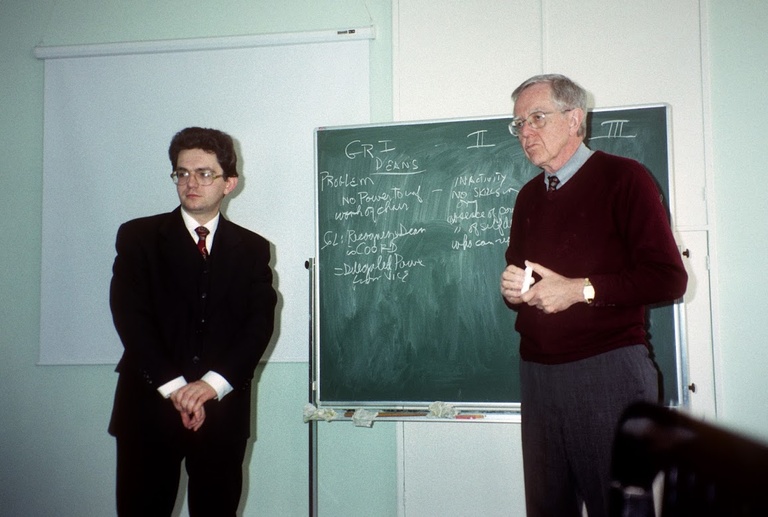
Photo from early in the project of UI Professor Jude West presenting the business curriculum in St. Petersburg along with his interpreter
In early 1996, five Russian physicians, who were chosen based on their medical knowledge, English language skills and recommendations from the MAPO faculty, began seven months of training in the University of Iowa Family Medicine Department. The family medicine curriculum included behavioral, community, preventive and laboratory medicine, medical decision making, patient education, geriatrics, pharmacology and general family medicine topics. The business management curriculum was delivered by six professors in the College of Business and included topics of management principles, finance and cost accounting, marketing, interpersonal skills, medical insurance and strategic planning. Trainees were able to apply their new clinical and business skills by working with private practice community family physicians during their stay in Iowa.
Having completed their training, our Russian physician guests returned to St. Petersburg and began their training of future Russian family physicians in the MAPO family medicine department and practiced in the newly established model office. With time the original trainees went their separate ways. Igor Bozhkov practiced in an employee health clinic and eventually applied his business training as director of medical health districts in the St. Petersburg area. True to the goal of introducing trainees into the market economy, Andrew Lobuznov established several private medical practices in St. Petersburg and is now practicing family medicine in Moscow. As an adjunct assistant professor in our department, Dr Lobuznov has helped coordinate Russian medical training activities for UI faculty, including Fulbright Scholar experiences for Professor Richard Dobyns in 1998. Ludmilla Degtjareva (Yaremenko) has remained as a professor in the family medicine department at the Northwestern State Medical University. She teaches family medicine to medical students, residents and community physicians and coordinates all educational activities for the department. Elena Alisky (Chertkova) and Ekatrina Pletinskaya taught and practiced with residents in the model office before returning to our department to complete a three-year family medicine residency. They are board certified family physicians, practicing family medicine in the United States.
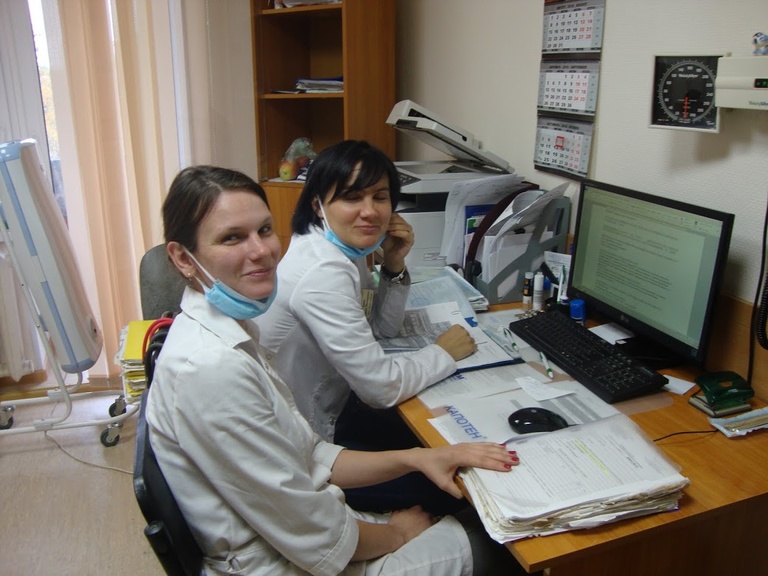
Family doctor and resident in the family medicine clinic
A total of 16 UI family medicine faculty have contributed to this institutional collaboration by developing and delivering curriculum, organizing and presenting at international medical conferences in St. Petersburg and hosting faculty and residents from the Northwestern State Medical University. Ten of these faculty members have spent time in Russia and have delivered over 50 presentations to an estimated 1,800 healthcare workers and medical university faculty. Eight Russian faculty have visited and studied in our department for up to four weeks at a time. Besides the initial five trainees participating in the USAID grant, there have been an additional four residents that have completed a four-week rotation in our department. Our residents have completed three clinical rotations in St. Petersburg. Collaborative research on family medicine training, cultural differences in late-life depression, functional assessment, palliative care and depression associated with diabetes has led to at least ten scientific publications.
Since 1996, Olga Kuznetsova, an Adjunct Professor in our department, has provided strong leadership as Professor and Head of the Department of Family Medicine at MAPO. My role has been to lead these activities for our department. We are now planning for a transition of leadership to assure the continued success of this collaboration. The first step in this transition was a visit to NWSMU in April of this year to identify new leaders here at Iowa and in Russia.
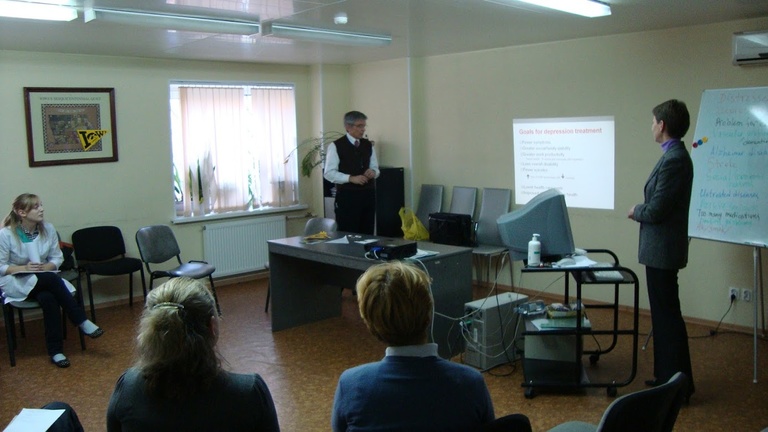
Professor Bergus from our department delivering a presentation to the Russian resident physicians.
The Russian Family Medicine Department has educated many learners in the principles and practices of family medicine. From 1996 to the present, 329 physicians have graduated from the two-year family medicine residency program. The department has retrained 974 general practitioners during a four to six-month course and provided a one-month refresher course for family doctors to 1,702 participants. They conducted short courses on prevention and communications skills for 4,204 primary health care specialists and trained 99 nurses. The department trained 5,862 residents from their university in advanced cardiac life support. In 2011 when MAPO became part of NWSMU the department took on the responsibility of family medicine training for medical students. All students (260 in last academic year) spend 6 weeks in the department and learn polyclinic therapy and introduction to primary health care.
All of the accomplishments listed above would not have been possible without the commitment of the University of Iowa and MAPO family medicine faculty and the stimulus grant from USAID. The sustainability of this collaboration has been accomplished by the champions in our departments, the international friendships that have blossomed from these educational adventures and continued grant support from the Dr. Richard O. Emmons Memorial Fund. Our partnership has enriched the lives of all those participating and hopefully has improved the lives of numerous patients through the development and dissemination of family medicine in Russia.